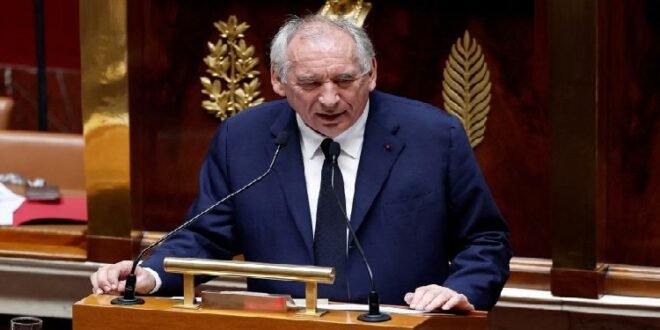11-09-2025
PARIS: The French government, led by Prime Minister Francois Bayrou, has collapsed after losing a vote of no confidence, tipping the Eurozone’s second-biggest economy into a political crisis and casting doubt over President Emmanuel Macron’s future.
 France’s Parliament voted on Monday to bring down the government over its budget proposal to cut $52bn aimed at slashing France’s fiscal deficit. Bayrou, a 74-year-old political veteran who called the vote himself in a bid to pressure lawmakers to back his plans, had been in office for only nine months.
France’s Parliament voted on Monday to bring down the government over its budget proposal to cut $52bn aimed at slashing France’s fiscal deficit. Bayrou, a 74-year-old political veteran who called the vote himself in a bid to pressure lawmakers to back his plans, had been in office for only nine months.
France has had four prime ministers in less than two years, and a fifth probably won’t be enough to break the country’s political deadlock. The paralysis is reminiscent of the instability last observed in 1958 when the Fifth Republic was established.
Ahead of the no-confidence vote, Bayrou spoke on Monday afternoon in the National Assembly, France’s lower house of Parliament, where he told lawmakers that the economy faced serious risks because of its deep indebtedness. He then fielded questions from parliamentarians, before the vote took place.
What could happen next?
For several weeks, lawmakers had made it clear they would vote against Bayrou’s state-slashing budget. Opposition parties from the far left to the far right hold 330 seats in the 577-seat National Assembly, so Monday’s ouster was widely expected.
After Monday’s vote, Bayrou’s government has collapsed. However, he will stay in office until President Emmanuel Macron decides what to do next. Unfortunately for the president, France lacks a consensus figure to replace Bayrou.
Macron is faced with uniquely hard choices, appoint another prime minister in the hope that he or she can pass an unpopular budget, call new elections to try to re-establish a parliamentary majority, or stand down himself, something he has refused to do before his term ends in 2027.
 With the arithmetic in Parliament unchanged, picking a new premier risks simply repeating the events from last year when Bayrou succeeded Michel Barnier.
With the arithmetic in Parliament unchanged, picking a new premier risks simply repeating the events from last year when Bayrou succeeded Michel Barnier.
A fiscal conservative, Macron is unlikely to appoint a premier who advocates for higher state spending but after the government recently tried to cut deals on the right of the political spectrum, some wonder if Macron might try something new.
According to Stefano Palombarini, assistant professor of economics at the University of Paris VIII, “the two previous appointments, Barnier and Bayrou, both failed. He (Macron) lost a lot of credibility in that process, and if he tries a similarly centrist approach, he’d lose even more.”
Palombarini told media that “in this context, it would make the scenario of a relative opening towards the left possible. Some Macronist, Socialist and Green politicians say they’re ready for compromises to form a government that lasts until 2027.”
Does this mean there is a clear political path?
Not really.
According to an opinion poll this month for Le Figaro Magazine by the Verian Group, just 15 percent of the electorate has confidence in Macron, down 6 percentage points since July. However, the president has consistently ruled out resigning from office.
Separate surveys by Ifop, Elabe and Toluna Harris Interactive indicated that 56 to 69 percent of French people want snap parliamentary elections, indicating growing dissatisfaction with current party politics in a country run by minority cabinets since 2022. (Int’l Monitoring Desk)
 Pressmediaofindia
Pressmediaofindia




